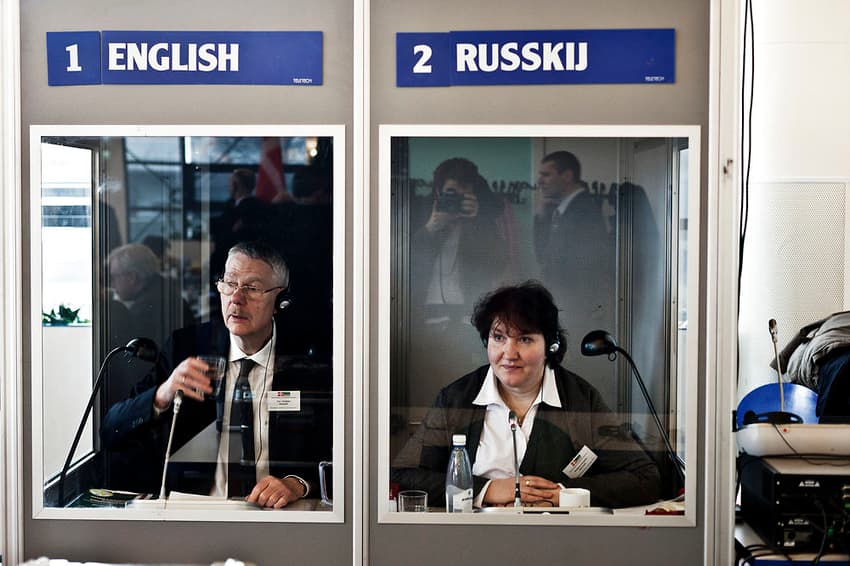Denmark’s interpreters join in opposition to 'unfit' new system

Several hundred interpreters in Denmark have joined a movement against a new National Police (Rigspolitiet) system which took effect on April 1st.
The interpreters communicate with each other via the Facebook group “Tolkeplatformen”, which currently has around 750 members. The language experts are set to start an association, Ritzau reports.
Previously, police or courts who needed the translation services of an interpreter would call a provider from an approved list.
A new system took effect at the beginning of this month after contractors were allowed to bid for the service. The company EasyTranslate won the contract.
But the company has struggled on a number of occasions to provide the necessary interpreters, and translators from the old list have rejected commissions on principal.
Problems with the new system include an incident earlier this week in which police released a Georgian who was suspected of shoplifting, after they were unable to find an interpreter. Charges against the man remain in place. The National Police admitted the issue but stressed the new system was only one week old at the time the Georgian was arrested.
The majority of people involved with the Tolkeplatformen group are interpreters from the previous list, Arabic interpreter Ala’a El-Beltagi told Ritzau.
El-Beltagi is part of an informal group which represents the interpreters, and whose task is to set up the more formal structure of an association.
“The new system is, in our view, deeply unfit for purpose in many regards. The general conditions have been worsened,” El-Beltagi said.
“This includes a reduction of between 15 and as much as 60 percent in commission fees, depending on the type of service,” the interpreter added.
One example of this is written translation, for which rates have been cut from 25 to 10 kroner per line, according to El-Beltagi.
“It is also problematic for us that communication must go through a company, when we previously have used our own names and built up a network,” he added.
Tolkeplatformen’s Facebook group includes translators, state-authorised interpreters, interpreters with academic backgrounds and self-taught professionals.
Many of the members – 684 in total – have signed a declaration stating their opposition to the new system. That includes interpreters with years of experience under their belt, El-Beltagi noted.
The issue is also a matter of principle relating to how interpreters are generally regarded, he said, stressing the importance of quality over cost-cutting.
Tolkeplatformen is set to hold a founding general meeting on April 28th, when a board, mission statement and statute will be selected for a new association.
“The forthcoming association will carry the baton forwards and work for better conditions for the interpretation profession,” he said.
READ ALSO: Denmark introduces interpreter charge at hospitals
Comments
See Also
The interpreters communicate with each other via the Facebook group “Tolkeplatformen”, which currently has around 750 members. The language experts are set to start an association, Ritzau reports.
Previously, police or courts who needed the translation services of an interpreter would call a provider from an approved list.
A new system took effect at the beginning of this month after contractors were allowed to bid for the service. The company EasyTranslate won the contract.
But the company has struggled on a number of occasions to provide the necessary interpreters, and translators from the old list have rejected commissions on principal.
Problems with the new system include an incident earlier this week in which police released a Georgian who was suspected of shoplifting, after they were unable to find an interpreter. Charges against the man remain in place. The National Police admitted the issue but stressed the new system was only one week old at the time the Georgian was arrested.
The majority of people involved with the Tolkeplatformen group are interpreters from the previous list, Arabic interpreter Ala’a El-Beltagi told Ritzau.
El-Beltagi is part of an informal group which represents the interpreters, and whose task is to set up the more formal structure of an association.
“The new system is, in our view, deeply unfit for purpose in many regards. The general conditions have been worsened,” El-Beltagi said.
“This includes a reduction of between 15 and as much as 60 percent in commission fees, depending on the type of service,” the interpreter added.
One example of this is written translation, for which rates have been cut from 25 to 10 kroner per line, according to El-Beltagi.
“It is also problematic for us that communication must go through a company, when we previously have used our own names and built up a network,” he added.
Tolkeplatformen’s Facebook group includes translators, state-authorised interpreters, interpreters with academic backgrounds and self-taught professionals.
Many of the members – 684 in total – have signed a declaration stating their opposition to the new system. That includes interpreters with years of experience under their belt, El-Beltagi noted.
The issue is also a matter of principle relating to how interpreters are generally regarded, he said, stressing the importance of quality over cost-cutting.
Tolkeplatformen is set to hold a founding general meeting on April 28th, when a board, mission statement and statute will be selected for a new association.
“The forthcoming association will carry the baton forwards and work for better conditions for the interpretation profession,” he said.
READ ALSO: Denmark introduces interpreter charge at hospitals
Join the conversation in our comments section below. Share your own views and experience and if you have a question or suggestion for our journalists then email us at [email protected].
Please keep comments civil, constructive and on topic – and make sure to read our terms of use before getting involved.
Please log in here to leave a comment.